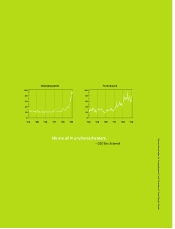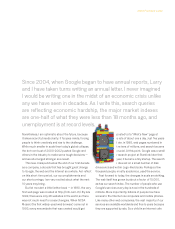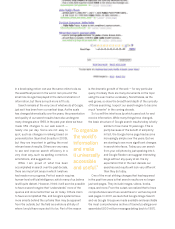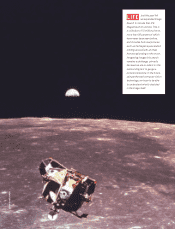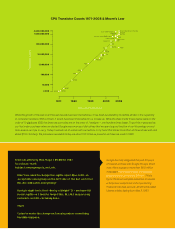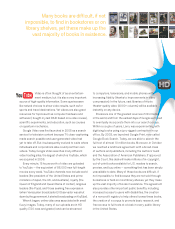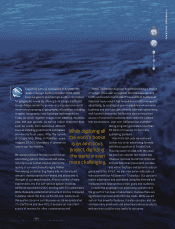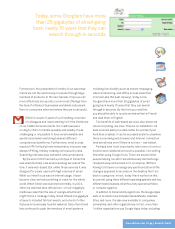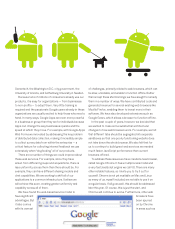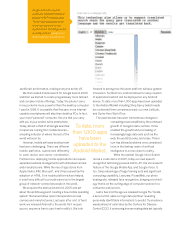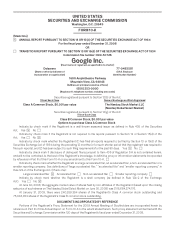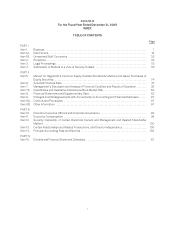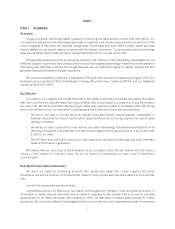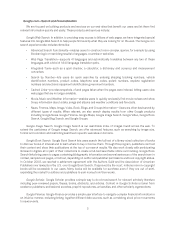Google 2008 Annual Report Download - page 12
Download and view the complete annual report
Please find page 12 of the 2008 Google annual report below. You can navigate through the pages in the report by either clicking on the pages listed below, or by using the keyword search tool below to find specific information within the annual report.
used for improving search quality can be brought to bear
on a seemingly unrelated issue and can help to save lives.
I believe this sort of approach can do even more — going
beyond monitoring to inferring potential causes and cures
of disease. This is just one example of how large data sets
such as search logs coupled with powerful data mining
can improve the world while safeguarding privacy.
Given the tremendous pace of technology, it is impossible
to predict far into the future. However, I think the past
decade tells us some things to expect in the next.
Computers will be 100 times faster still and storage will
be 100 times cheaper. Many of the problems that we
call artifi cial intelligence today will become accepted as
standard computational capabilities, including image
processing, speech recognition, and natural language
processing. New and amazing computational capabilities
will be born that we cannot even imagine today.
While about half the people in the world are online
today via computers and mobile phones, the Internet will
reach billions more in the coming decade. I expect that
by using simple yet powerful models of computing such
as web services, everyone will be more productive. These
tools enable individuals, small groups, and small busi-
nesses to accomplish tasks that only large corporations
could achieve before, whether it is making and releasing
a movie, marketing a product, or reporting on a war.
When I was a child, researching anything involved a long
trip to the local library and a good deal of luck that one
of the books there would be about the subject of interest.
I could not have imagined that today anyone would be
able to research any topic in seconds.
The dark clouds currently looming over the world
economy are a hardship for us all, but by the time today’s
children grow up, this recession will be a footnote in history.
Yet the technologies that we create between now and
then will defi ne their way of life.
While the world is increasingly
going online, there is also a
grave risk to the future of the
Internet — multiple governments
(in Europe, the Americas, and Asia)
are exercising or contemplating enacting
various forms of censorship. We are
aggressive about the legal means we use
to defend freedom of expression and we
always tell our users when information
or websites have been removed from our
web search results for such reasons.
Last December, as part of our commit-
ment to free expression and guarding our
users’ privacy, Google was one of three
companies to sign on to the Global Network
Initiative — an e ort by companies,
human rights groups, socially responsible
investors, and others to come together to
protect and advance those rights. While
Google has always promoted these rights,
the Initiative enables us to join together
with the other groups to lobby on behalf
of these causes.
As a company, ultimately we have limited
options other than withdrawing from
a country altogether and providing no
information or communications tools at
all to its people. Since open access to
information is critical for human rights,
including freedom of expression,
I believe those nations that value those
rights should make them a critical
part of their foreign policy and trade
negotiations agenda.
Sergey Brin
Co-Founder; President, Technology
Larry Page
Co-Founder; President, Products
ili percentage
2007-2008 U.S. Flu Activity - Mid-Atlantic Region
4%
2%
0
• Google Flu Trends
• CDC Data
April 21, 2008


